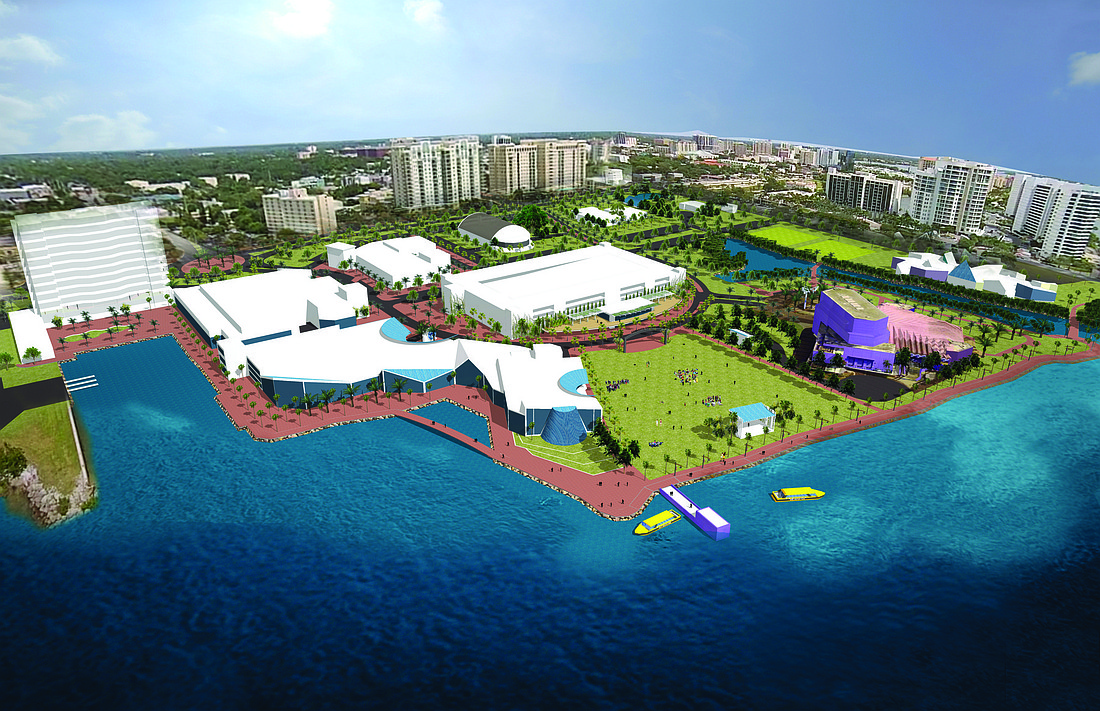- April 15, 2024
-
-
Loading

Loading

For years, various parties have pushed for a new conference or convention center in Sarasota. Earlier this summer, the Sarasota City Commission put the kibosh on the most recent push before it could get off the ground, a move that has garnered criticism from other local officials.
After attending a presentation from a developer whose proposed vision for city-owned bayfront land near the Van Wezel Performing Arts Hall parking lot includes a 60,000-square-foot conference center, Vice Mayor Susan Chapman proposed a series of guidelines governing the future of that land.
One of those guidelines, approved in a 3-2 vote, restricted a convention center from being constructed on the public land. In proposing that restriction, Chapman cited previous public input and an admission from the developers that conference centers are money-losing ventures.
Although the motion passed, several city and county commissioners said Chapman was misconstruing the proposal. At an Aug. 20 County Commission workshop, multiple commissioners questioned whether the city was open to investment based on the discussion surrounding the convention center.
“There’s no doubt — one or two commissioners have sabotaged this thing, and their comments are unconscionable,” County Commissioner Joe Barbetta said. “It’s unfortunate, and it’s caused damage to future development, including anyone who’s interested in investing in the city.”
Sarasota Bayfront Now is the group behind that development plan for the waterfront land. In addition to the conference center, the proposal includes a bayfront Mote Marine aquarium and a 3-acre public park on the city-owned property.
At the July 18 presentation Chapman attended, the Sarasota Bayfront Now group acknowledged that, for municipalities, conference centers have historically been a bad investment.
“Those discussions have always died when the bottom line comes up, when the rubber hits the road — and that is the annual operating deficit,” said Chris Cogan, a co-managing partner with the venture capital firm Seven Holdings. “Conference centers lose money, period.”
To avoid that issue, the group’s proposal called for an adjacent hotel operator to cover the operating expenses of the conference center.
Even with that wrinkle, the presentation alarmed Chapman. At the following week’s City Commission meeting, Chapman proposed a series of parameters for the development of the city-owned land near the Van Wezel, which is currently undergoing a city-endorsed visioning process led by multiple groups under the banner of Sarasota Bayfront 20:20.
Chapman’s proposal included the following restrictions: that the land will always remain public property; that public access to the property will be maintained; that the current public view corridor will not be impacted; and that a convention center will not be built on the land.
Chapman cited the group’s admission that conference centers are not a moneymaker as a reason for that final provision. She also said the city’s 2007 Cultural Park Master Plan, which focused on that property, should be a guiding force as the master-planning process continues for the city-owned land.
The Cultural Park Master Plan, which cost $400,000 and was developed with public input, did not include a conference center in its series of recommendations for the 42 acres of public land surrounding Van Wezel.
“With a lot of public input and consultant time, there was a decision that a conference center was not an appropriate investment of public resources or public land,” Chapman said.
Commissioners Paul Caragiulo and Suzanne Atwell dissented from the majority that approved Chapman’s proposal. Atwell said she believed Chapman was misrepresenting the proposal from Sarasota Bayfront Now. In addition to mentioning that conference centers lose money, Chapman said her takeaways from the presentation were that aquariums lose money and hotels lose money.
“I think we’re really getting ahead of ourselves,” Atwell said. “I met with that group, and I did not come away with that.”
Representatives for Sarasota Bayfront Now said their plans are more nuanced than Chapman’s characterizations. Cogan admitted that earlier studies forecasted a roughly $3 million annual deficit for a Sarasota conference center. Those studies were predicated on a larger space, however — between 90,000 and 120,000 square feet. Cogan said that the expenses would be reduced under their proposal.
“This conference center is scaled to the size of Sarasota,” Cogan said. “It’s scaled to the size of conferences we could bring here.”
Cogan did say that aquariums frequently lose money, and that there are fewer than 20 exceptions. One of those exceptions, however, is Mote Marine Laboratory’s current aquarium on City Island. Cogan added that the presence of the aquarium could be a boon for its proposed neighbor, because Mote has expressed an interest in hosting conferences in its scientific fields.
Although it would not directly pay for the conference center, the city may have to bear some burden for the operating expenses under the Sarasota Bayfront Now proposal. At the July presentation, representatives for Sarasota Bayfront Now said that some portion of the sales, bed and property taxes generated by the proposed developments could be funneled directly toward maintenance and improvements in that same area.
Atwell and Caragiulo have criticized their fellow commissioners for not going into the visioning process with an open mind. Atwell said that circumstances may have changed significantly in the past seven years, while Caragiulo said creating restrictions from the outset seemed to be at cross purposes with a broad community visioning process.
“These are the very early stages,” Caragiulo said. “We’re going to have a conversation about what the community would like to see happen, yet we’re saying, ‘The community doesn’t want this, this, this or that.’”
Still, the majority of the commission is OK with not considering a bayfront conference center as the master-planning process moves forward. Mayor Willie Shaw said that, although it’s seven years out from the completion of the Cultural Park Master Plan, the sentiment that crafted the document still rings true.
“I understand times have changed,” Shaw said. “I also understand the players have changed, but the ideas are the same.”